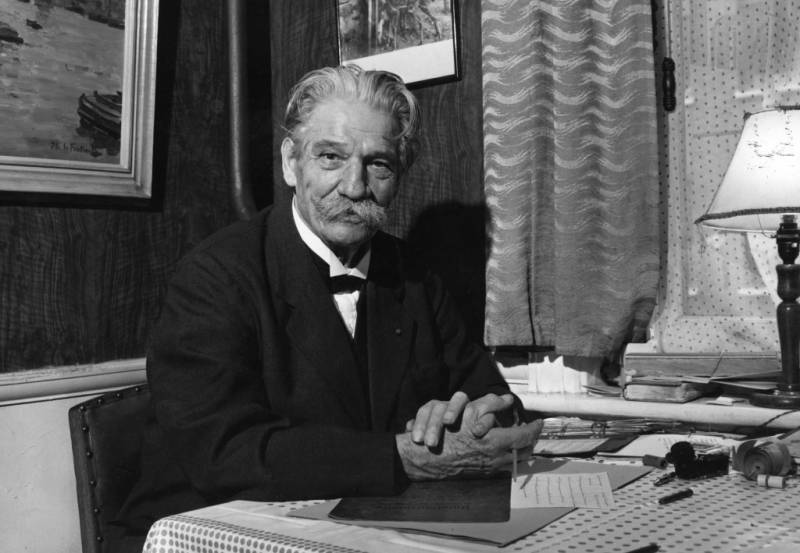During working on the ethical and philosophical conception of “Reverence for life”, French-German theologian, organist, philosopher, and physician Albert Schweitzer was urged by his friends and journalists to speak on the political culture of his time. He remained silent for a long time because he did not want to politicise his efforts and services for humanity. When he observed humanity on the brink of destruction during WWII, Schweitzer showed his concerns about nuclear bombs by writing a letter in the Daily Herald in London in 1954. He also talked about his apprehensions about nuclear weapons during his speech of Noble Peace Prize of 1952 in Oslo.
Albert Einstein and other scientist friends insisted him he raise his voice against nuclear bombs and safety concerns of public and humanity. He avoided from commenting over any political event but after the test of the Hydrogen bomb in 1954, he began to study politics and long term impacts of the nuclear bomb on human beings. Robert Jungk wrote about this: “Almost everyone who met Schweitzer privately between the year 1954 and 1957 was questioned very intensly about the ‘nuclear danger’”.
After all efforts, motivation and inspiration of his friends, Schweitzer spoke up against the usage of nuclear bomb and military implications regarding the technology in ethical paradigms. He wrote a letter to American President Dwight Eisenhower with these words: “In my heart I carry the hope I may somehow be able to contribute to the peace of the world. This I know has always been our deepest wish. We both share the conviction that humanity must find a way to control the weapons which now menace the very existence of life on earth. May it be given to us both to see the day when the world’s people will realise that the fate of all humanity is now at stake, and that it is urgently necessary to make the bold decisions that can deal adequately with the agonising situation in which the world now finds itself.”
Schweitzer delivered a lecture, “Declaration of Conscience” on April 1957. The lecture was transmitted throughout the world via radiosbut many governments prohibited broadcasting his lecture. More than 140 radio stations broadcasted the declaration, realizing the ethical importance of the declaration’s contents. He became a staunch advocate of peace and humanity by putting away the usage of nuclear technology for temporal national interests. Most intellectual names and well-known scientists who were good friends like Bertrand Russell, Norman Cousins, Einstein and Pablo Casals backed him up.
Over the 83rd birthday of Schweitzer, the chemist and noble prizewinner Linus Pauling submitted a petition to the United Nations on the 14th January 1958. The petition was signed by Schweitzer and 9,235 scientists. The purpose of the petition was to urge international powers and community to stop nuclear weapons tests.
Schweitzer prepared three appeals regarding nuclear technology which shook the tectonic plates of academia and international politics. In the same year, three speeches –‘The renunciation of nuclear tests’, ‘The danger of an atomic war’ and ‘Negotiations at the highest levels’- were published by Henry Holt in New York under the sway of Schweitzer’s essay of “Peace or Atomic war”. These three writings were translated into several languages. After knowing the danger of the nuclear technology and destruction in the cities of Japan where America threw atomic bombs, people rioted and a number of strikes were reported against nuclear technology.
Under the pressure of intellectuals, organisations and public strikes, America and Britain showed their commitment to not holding nuclear tests. USSR also urged all members to stop nuclear tests. Later on, France started to hold nuclear weapons’ tests in order to gain the status of Nuclear State in 1960. With the violation of test-ban moratorium by France, USSR and America announced their upcoming nuclear weapons tests. A wave of strikes started and many scientists and intellectual became active to urge the nations to adopt the moratorium.
Schweitzer wrote a letter to President Kennedy over the intense situation in these words, as someone who had occupied himself for a long time with the problem of atomic weapons and with problem of peace. He took the stance that “disarmament under effective international control” is the important goal and that negotiations toward this end should not be “made questionable by unnecessary appeals for international verification of the discontinuance of testing”. He declared that “only when states agree not to carry out tests any more can promising negotiations about disarmament and peace take place.” Then he took the courage to draw the attention of the president “to something that concerns you personally” - the hereditary effect of radioactivity on children. He closed by saying: “It was not easy for me to draw your attention to the great responsibility you hold to protect the future generations. Please forgive me; I could not do otherwise, not only for the sake of humanity, but also out of consideration for you personally”.
During the growing crisis in Cuba, America showed a desire to hit the land with a nuclear bomb in order to resolve the Cuban crisis. He also wrote an open letter to the American Secretary of defense. After the end of the crisis, Schweitzer changed his tactic and insisted other friends to write an open letter to Minister of Defense, Robert McNamara, saying, “We cannot stop criticising McNamara in public very strongly, because he announced that he would use nuclear bombs”.
Schweitzer devoted his life to secure the future of humanity and the planet by speaking up against nuclear weapons. He provided a road-map to his human fellows to lift up their voice against the technology because the world is insecure at the hands of nuclear powers. It is time to follow the test-ban moratorium by all countries whether they are atomic powers or not.






